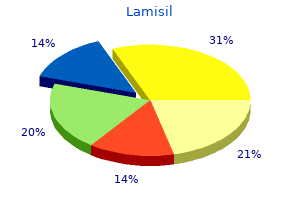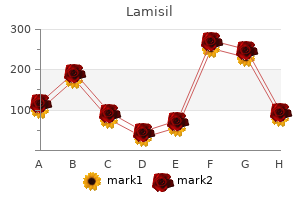"Purchase 250mg lamisil with mastercard, antifungal rash".
By: Z. Daro, M.A.S., M.D.
Assistant Professor, Medical College of Georgia at Augusta University
This is exploited in the treatment of hypercalcaemia when furosemide is given after volume replacement with 0 antifungal cream for face lamisil 250mg on line. Drug interactions Loop diuretics increase the nephrotoxicity of first-generation cephalosporins fungus gnats and cannabis buy lamisil 250 mg otc. Lithium reabsorption is reduced by loop diuretics and the dose of lithium carbonate often needs to fungus eye buy lamisil without a prescription be reduced. Na /K exchange antagonists that do not compete with aldosterone: amiloride, triamterene. High doses of spironolactone causes gynaecomastia and breast tenderness in men and menstrual irregularity in women oestrogenic side effects. It is much more expensive but has been shown to improve survival following myocardial infarction (Chapter 29). Amiloride and triamterene also inhibit Na /K exchange, but not by competition with aldosterone. They are marketed as combination tablets with loop or thiazide diuretics as a means of avoiding hypokalaemia. Hypokalaemia is important if drugs such as digoxin (Chapters 31 and 32) or sotalol (Chapter 32) are co-prescribed, because their toxicity is increased by hypokalaemia. The presence of a substantial quantity of a poorly absorbable solute opposes this, because as water is reabsorbed the concentration and hence the osmotic activity of the solute increases. Mannitol is poorly absorbed from the intestine and is given intravenously in gram quantities. Unlike other diuretics, osmotic diuretics increase the plasma volume (by increasing the entry of water to the circulation as a result of increasing intravascular osmolarity), so they are unsuitable for the treatment of most causes of oedema, especially cardiac failure. It is possible that, if used early in the course of incipient acute renal failure, osmotic diuretics may stave off the occurrence of acute tubular necrosis by increasing tubular fluid flow and washing away material that would otherwise plug the tubules. Osmotic diuretics are mainly used for reasons unconnected with their ability to cause diuresis. Because they do not enter cells or some anatomical areas, such as the eye and brain, they cause water to leave cells down the osmotic gradient. Antidiuretic hormone secretion results in a concentrated urine, while continued drinking (as a result of dietary habit) leads to progressive dilution of the plasma, which becomes hypo-osmolar and hyponatraemic. Hyponatraemia that has arisen gradually can be corrected gradually by restricting fluid intake. This does not cause thirst (because the plasma is hypo-osmolar), but may not be well tolerated because of habit. Rapid correction of hyponatraemia to levels greater than 125 mmol/L is potentially harmful and is associated with central pontine myelinolysis, with resultant devastating loss of brainstem function. In common with other tetracyclines, it increases plasma urea levels and can produce deterioration of renal function and increased loss of sodium in the urine. Even in Addisonian crisis, where the definitive treatment is replacement with glucocorticoid and mineralocorticoid hormones, emergency treatment pivots on replacement of what is depleted, i. The same is true of diabetic ketoacidosis, where the critical life-saving intervention is the rapid infusion of large volumes of isotonic saline, as well as insulin (Chapter 37). In patients with hypovolaemia due to acute and rapid blood loss, the appropriate fluid with which to replace is blood. In some situations, particularly when hypoalbuminaemia and oedema coexist with acute blood volume depletion, infusion of solutions of high-molecular-weight colloid. Anaphylactoid reactions are an unusual but severe adverse effect of such treatment. The most physiologically important actions of vasopressin, including its antidiuretic effect, are mediated by V2-receptors which are coupled to adenylyl cyclase. V1-receptors activate the phosphatidyl inositol signalling system in vascular smooth muscle, mobilizing cytoplasmic calcium and causing vasoconstriction. Consequently, water leaves the collecting ducts passively down its osmotic gradient from tubular fluid (which is hypotonic at the beginning of the distal tubule) into the highly concentrated papillary interstitium. This process results in the formation of a small volume of highly concentrated urine under the influence of vasopressin.

Syndromes
- Abdominal ultrasound
- Stress, anxiety, or fatigue can cause a postural tremor
- Low libido due to physical/hormonal problems, psychological problems, or relationship problems
- Protein malnutrition
- Bicarbonate
- Foamy appearance of urine
- Problems with the urinary system

Nonprescription Diabetes Test Device "Nonprescription diabetes test device" means a glucose meter or test strip for use in the treatment of prediabetic or diabetic individuals that may be sold without a prescription and that is labeled for use by the consumer in accordance with the requirements of the laws and rules of this state and the federal government antifungal nail pills discount 250mg lamisil. Good Standing "Good standing" means a license issued by the board that is unrestricted by disciplinary action taken pursuant to antifungal ysp order lamisil 250 mg online Chapter 5 (commencing with Section 11500) of Part 1 of Division 3 of Title 2 of the Government Code antifungal hair oil buy lamisil overnight delivery. Skilled Nursing Facility Intermediate Care Facility Other Health Care Facilities (a) As used in this chapter, the terms "skilled nursing facility," "intermediate care facility," and other references to health facilities shall be construed with respect to the definitions contained in Article 1 (commencing with Section 1250) of Chapter 2 of Division 2 of the Health and Safety Code. Licensed Hospital "Licensed hospital" means an institution, place, building, or agency that maintains and operates organized facilities for one or more persons for the diagnosis, care, and treatment of human illnesses to which persons may be admitted for overnight stay, and includes any institution classified under regulations issued by the State Department of Public Health as a general or specialized hospital, as a maternity hospital, or as a tuberculosis hospital, but does not include a sanitarium, rest home, a nursing or convalescent home, a maternity home, or an institution for treating alcoholics. Hospital Pharmacy (a) "Hospital pharmacy" means and includes a pharmacy, licensed by the board, located within any licensed hospital, institution, or establishment that maintains and operates organized facilities for the diagnosis, care, and treatment of human illnesses to which persons may be admitted for overnight stay and that meets all of the requirements of this chapter and the rules and regulations of the board. As a condition of licensure by the board, the pharmacy in another physical plant shall provide pharmaceutical services only to registered hospital patients who are on the premises of the same physical plant in which the pharmacy is located, except as provided in Article 7. The pharmacy services 38 provided shall be directly related to the services or treatment plan administered in the physical plant. Nothing in this subdivision shall be construed to restrict or expand the services that a hospital pharmacy may provide. Intern Pharmacist "Intern pharmacist" means a person issued a license pursuant to Section 4208. Laboratory "Laboratory" means a research, teaching, or testing laboratory not engaged in the dispensing or furnishing of drugs or devices but using dangerous drugs or dangerous devices for scientific or teaching purposes. Every laboratory shall maintain an established place of business and keep purchase records. License "License" means and includes any license, permit, registration, certificate, or exemption issued by the board and includes the process of applying for and renewing the same. Manufacturer (a) (1) "Manufacturer" means and includes every person who prepares, derives, produces, compounds, or repackages any drug or device except a pharmacy that manufactures on the immediate premises where the drug or device is sold to the ultimate consumer. Outsourcing Facility "Outsourcing facility" means a facility that meets all of the following: (a) Is located within the United States of America at one address that is engaged in the compounding of sterile drugs and nonsterile drugs. Person "Person" includes, but is not limited to, firm, association, partnership, corporation, limited liability company, state governmental agency, trust, or political subdivision. Pharmacist "Pharmacist" means a natural person to whom a license has been issued by the board, under Section 4200, except as specifically provided otherwise in this chapter. The holder of an unexpired and active pharmacist license issued by the board is entitled to practice pharmacy as defined by this chapter, within or outside of a licensed pharmacy as authorized by this chapter. Pharmacy (a) "Pharmacy" means an area, place, or premises licensed by the board in which the profession of pharmacy is practiced and where prescriptions are compounded. Pharmacy Technician (a) "Pharmacy technician" means an individual who assists a pharmacist in a pharmacy in the performance of his or her pharmacy related duties, as specified in Section 4115. Prescription; Content Requirements (a) "Prescription" means an oral, written, or electronic transmission order that is both of the following: (1) Given individually for the person or persons for whom ordered that includes all of the following: (A) the name or names and address of the patient or patients. In the event of a conflict between this subdivision and Section 11164 of the Health and Safety Code, Section 11164 of the Health and Safety Code shall prevail. Reverse Distributor "Reverse distributor" means every person who acts as an agent for pharmacies, drug wholesalers, third-party logistics providers, manufacturers, and other entities by receiving, inventorying, warehousing, and managing the disposition of outdated or nonsaleable dangerous drugs or dangerous devices. Veterinary Food-Animal Drug Retailer "Veterinary food-animal drug retailer" is an area, place, or premises, other than a pharmacy, that holds a valid license from the Board of Pharmacy of the State of California as a wholesaler and, in and from which veterinary drugs for food-producing animals are dispensed pursuant to a prescription from a licensed veterinarian. Veterinary Food-Animal Drugs "Veterinary food-animal drugs" as used in this chapter shall include the following: (a) Any drug to be used in food-producing animals bearing the legend, "Caution, federal law restricts this drug to use by or on the order of a licensed veterinarian" or words of similar import. Wholesaler "Wholesaler" means and includes a person who acts as a wholesale merchant, broker, jobber, customs broker, reverse distributor, agent, or a nonresident wholesaler, who sells for resale, or negotiates for distribution, or takes possession of, any 45 drug or device included in Section 4022. Unless otherwise authorized by law, a wholesaler may not store, warehouse, or authorize the storage or warehousing of drugs with any person or at any location not licensed by the board. Repackager "Repackager" means a person or entity that is registered with the federal Food and Drug Administration as a repackager and operates an establishment that packages finished drugs from bulk or that repackages dangerous drugs into different containers, excluding shipping containers. Remote Dispensing Site Pharmacy (a) "Remote dispensing site pharmacy" means a licensed pharmacy located in this state that is exclusively overseen and operated by a supervising pharmacy and staffed by one or more qualified registered pharmacy technicians, as defined in Section 4132, where pharmaceutical care services, including, but not limited to, the storage and dispensing of prescription drugs and controlled substances, drug regimen review, and patient counseling, are remotely monitored or provided, or both, by a licensed pharmacist through the use of telepharmacy technology. Reverse Third-Party Logistics Provider "Reverse third-party logistics provider" means an entity that processes or manages the disposition of an outdated or nonsaleable dangerous drug or dangerous device on behalf of a manufacturer, wholesaler, or dispenser of the dangerous drug or dangerous device, but does not take ownership of the dangerous drug or dangerous device nor have the responsibility to direct its sale or disposition. Unless otherwise specified in this chapter, every provision of this chapter that applies to a third-party 46 logistics provider shall also apply to a reverse third-party logistics provider.

